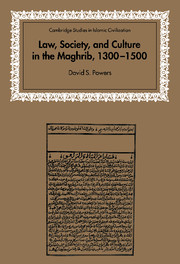Book contents
- Frontmatter
- Contents
- List of figures and tables
- Preface
- Introduction
- 1 Kadijustiz or Qāḍi-Justice? A Paternity Dispute from Fourteenth-Century Morocco
- 2 From Almohadism to Mālikism: The Case of al-Haskūrī, the Mocking Jurist, ca. 712-716/1312–1316
- 3 A Riparian Dispute in the Middle Atlas Mountains, ca. 683-824/1285–1421
- 4 Conflicting Conceptions of Property in Fez, 741–826/1340–1423
- 5 Preserving the Prophet's Honor: Sharīfism, Sufism, and Mālikism in Tlemcen, 843/1439
- 6 On Judicial Style: Two Fatwās on Tawlīj (ca. 880/1475)
- Conclusion: The Muftī
- Bibliography
- Index of Qur'ānic Verses
- Index of Prophetic Ḥadīth
- Index of Names
- Subject index
3 - A Riparian Dispute in the Middle Atlas Mountains, ca. 683-824/1285–1421
Published online by Cambridge University Press: 05 July 2014
- Frontmatter
- Contents
- List of figures and tables
- Preface
- Introduction
- 1 Kadijustiz or Qāḍi-Justice? A Paternity Dispute from Fourteenth-Century Morocco
- 2 From Almohadism to Mālikism: The Case of al-Haskūrī, the Mocking Jurist, ca. 712-716/1312–1316
- 3 A Riparian Dispute in the Middle Atlas Mountains, ca. 683-824/1285–1421
- 4 Conflicting Conceptions of Property in Fez, 741–826/1340–1423
- 5 Preserving the Prophet's Honor: Sharīfism, Sufism, and Mālikism in Tlemcen, 843/1439
- 6 On Judicial Style: Two Fatwās on Tawlīj (ca. 880/1475)
- Conclusion: The Muftī
- Bibliography
- Index of Qur'ānic Verses
- Index of Prophetic Ḥadīth
- Index of Names
- Subject index
Summary
Muslims are partners in three things: water, fire, and pasture.
(prophetic ḥadīth)O Prophet of God, what thing is there that is not lawful to withhold? He said, “Water”,
(prophetic ḥadīth)Whoever is first to that in which no Muslim has preceded him, he has prior claim to it.
(prophetic ḥadīth)Those living upstream retain [the water] until it reaches the ankles; then they send [it down],
(prophetic ḥadīth)In the cases analyzed in chapters one and two, the plaintiff and defendant were specific individuals who lived in or near Fez and were members of the urban bourgeoisie. In each instance, the case was settled in a timely manner and resulted in the issuance of a ḥukm or judgment. But the apparatus of Marīnid justice extended to rural communities living in the countryside outside of Fez and it included alternative means of dispute resolution.
In the present chapter, we will examine a dispute between two rural communities on the banks of a wadi in the Middle Atlas mountains, approximately 40 km south of Fez. We will follow these two communities in and out of the Marīnid courts as they attempted to resolve competing Claims to vital water resources over nearly 150 years. During this period a series of qāḍīs and muftis were called upon to deal with the interplay of Islamic law, on the one hand, and the changes in economic, climatic, and environmental conditions, on the other.
- Type
- Chapter
- Information
- Law, Society and Culture in the Maghrib, 1300–1500 , pp. 95 - 140Publisher: Cambridge University PressPrint publication year: 2002



